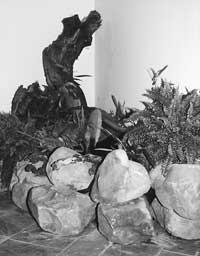Ramón Margalef, pioneer in ecology
1999/05/01 Apalategi, Inaxi Iturria: Elhuyar aldizkaria
He has dedicated much of his life to the sea. Why?
No, no. Perhaps it was an important factor in appearance, but only in appearance, that the sea offered a simpler, less complicated view of the functioning of nature; the lack of wood inside the liquid, the existence of a different medium, etc. And on the other hand, as a child I observed things of fresh water, since with a simple microscope you can make very interesting observations. And in a very small space, on the ground there are systems that require tens or hundreds of meters.
Do you have any special relationship with the sea (family…)?
No, the whole family is inside.
It can be said that the consciousness of nature has changed during all these years, not the same as it seems, but...
Do you believe? I'm not so sure. The change has occurred in use, yes; perhaps there has been some awareness, but it has certainly been used as an instrument of propaganda and sale of many things.
Maybe that's what was needed. In a world where everything moves with economic agents, it is possible that this is the solution, that is, to obtain an economic benefit from nature.
The solution is not, because no solution has been found. Yes, it benefits from the ecological propaganda of things, but no progress has been made, as the growing expropriation and mistreatment of nature has barely been compensated. The number of people and the economic capacity of the people has increased, to which all the machines and instruments of destruction have been added (cars, manufacturing of all kinds...), the damage has not been compensated. Nor should we begin to cry, but the deterioration is not compensated.
However, knowledge has been advanced at least. Can we say that we know the functioning of nature both at sea and on earth?
Much progress has been made in this regard and we know many things, but there is still much that is lacking, which requires further development of science.
Still, from time to time and in relation to rivers and streams, the water that goes out to the sea without human use is lost and similar water. Is that so?

That is not so at all. A quantity of water falling from the sky to the continents passes through the soil and plants. Plants, for example, cannot remain without water, so a quantity of water has to return to the sky. On the other hand, continents and oceans have a dynamic relationship, since the amount of water flowing through the earth is essential for the development and evolution of the soil (for the distribution of materials needed by plants, etc. ), but in turn organic matter is supplied and directed to the sea. The sea has always been heterotrophic, that is, it consumes organic matter from the land, the sea has the vocation of "sewer". And this system must continue to operate, not only to feed the sea, but also to allow soil development and maintain its fertility. Therefore, the idea that all water falling from the sky is privatizable is not correct. It is noteworthy. I have said many times that no drop of water should reach the sea, even if it seems programmed, is not a new idea, since a king of Sri Lanka said 2,000 years ago and is also false. This system has always worked this way and should continue this way if we want to maintain soil development and fertility. I think we have to take into account the three-thirds law that is easy to remember: one third has to return to the sky through vegetation, another through marine waters and the last third would be privatizable for other uses.
In this sense, what do you think of bringing water from one basin to another?
In short, water trawling within the aforementioned measures has no special impact. In this respect, the only thing to mention is that the soil and the local vegetation is in balance with the falling water and with the existing evacuation routes in the place. If we carry water from one side to the other, we could break that balance, if we take water from the territories with more rains and take it to those that less rains, from the point of view of the justice would be fine, but in the area of maximum rain we would have to replace the beech trees with pines. Another serious thing, even if it is not the one that seems, is that the waters of the different zones have different characteristics (due to the collection of salts by the rainwater) and that the risk would be in the inertization of the same when moving waters of certain quality to lands of different quality. This is not very common, since in the areas of greatest rainfall the waters are usually more diluted, but in some cases, as in the Monegros, there are such situations and there are very sad examples, as in the case of Russia, of catastrophes caused by this type of use of water the salinization of the Aral Sea.
As far as water transfer is concerned, has any species been observed to undergo a certain change of place through water?
To some extent yes, but that is almost inevitable. The quality of the water is the one that acts as a selector, but in the interior of Spain, although the different basins have a relatively different fauna and flora, this is not so important and also the species are transported from one place to another, as happens with the crabs.
The title of his lecture today is striking ("The Basque Child, the sacred Provencal cows and the avid intentions of putting the greenhouse under the carpet"). What do you mean?
Yes, it is baroque, but it coincides with what I will explain. On the one hand, I will expose the reflection of El Niño here. Sacred cows are highly respected animals, and in this case I will put the whales at their height, in relation to the great fertility of the Mediterranean northwest. Finally, leaving large amounts of trash on the seabed is a current issue.
What will be the main idea you will convey at the conference?
Above all we know that we know a few things, many things not, and that it is advisable to be prudent, without too much fear of danger and doing things carefully.
- Dr. Ramón Margalef
- Born in Barcelona in 1919.
- One of the pioneers in ecological research. He has used information theory in ecological research and has created mathematical models for population research.
- Director of the "Instituto de Investigaciones Pesqueras" and Professor of Ecology at the University of Barcelona.
- Among all the published works are: Ecologia (1974) and Limnología (1983).
- She has been awarded several university awards and numerous scientific awards. Among others: Prince Albert Medal (from the Paris Institute of Oceanography), Huntsman Prize (Nobel Prize for Oceanography), Naumann Thienemann Medal (Highest Level Award in Limology), Ramon y Cajal Prize and Narcis Monturiol Prize.

Gai honi buruzko eduki gehiago
Elhuyarrek garatutako teknologia





